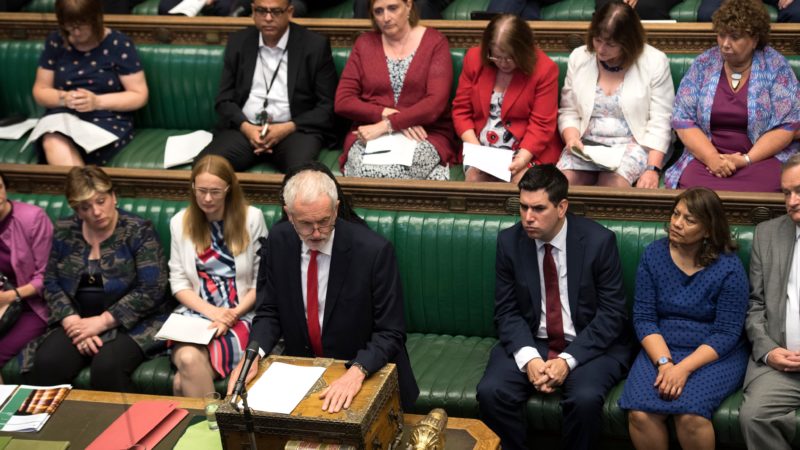
There is only one subject of discussion in the Labour Party today: antisemitism. The BBC Panorama episode broadcast last night posed the question ‘Is Labour antisemitic?’ and featured eight former staffers, four of whom had signed non-disclosure agreements. They made claims about leader’s office interference in the handling of antisemitism cases, general secretary interference in the party’s highest disciplinary body (the NCC) and a toxic working environment. The key points are summarised here along with rebuttals from the Labour Party to each individual claim and its full response issued before the programme was aired.
Labour has not backed down. In the past, to the disappointment of some supporters, the leadership has adopted a conciliatory approach on occasion – but not this time. Lengthy responses were provided to rebut each claim made in the programme, and several even lengthier replies were sent out about the investigation as a whole. The tone has been consistently robust, as with the pre-emptive attacks of Momentum and Jon Lansman on the BBC, and the Labour Press Team angrily tweeted throughout the transmission. Here is a piece on the claims, contributors and reactions including Labour’s full post-broadcast statement.
The programme undoubtedly entrenched the (already crucial) factional aspect of Labour’s protracted antisemitism crisis. While many MPs and activists praised the bravery of those who spoke out, some Corbynites were keen to point out that they were not from the party’s left. Unlike the times when Labour left figures such as Lansman say antisemitism in the party is a genuine problem and more should be done to tackle it, the effect of the Panorama special was to realign views according to internal political groupings.
Amid the fierce factional battles, some activists seem to have lost perspective. Broader issues raised in the programme, particularly the mental ill health of staffers, were largely ignored. One contributor, Sam Matthews, Labour’s former head of disputes, said he considered committing suicide at work by walking off the roof of the HQ building. Whatever you think of party infighting, whether you believe that the extent of Labour antisemitism has been exaggerated to damage Jeremy Corbyn or not, it cannot be in keeping with the Labour Party’s values to ignore this testimony.
To move forward constructively, the focus must turn to how Labour’s disciplinary process should be reformed so that confidence can be restored – because, at the moment, nobody is happy with it. Keir Starmer and Tom Watson have endorsed the idea of an auto-exclusion rule for members who have a “prima facie case to answer” on antisemitism. This could be introduced if agreed by the ruling body (NEC) and conference. “Jeremy has the votes on our NEC – if he willed it, it could happen,” Watson told Radio 4 this morning.
The deputy leader said the benefit of this new rule would be that members accused of antisemitism couldn’t “go to party meetings anymore where Jewish members feel threatened”. Suspension already does this, however. While auto-exclusion would send a stronger message than suspension, the risk is that it would encourage factionally-motivated complaints from all sides. I understand that Watson would want this rule to apply only to situations where there is clear evidence (such as the Kayla Bibby case, one assumes). But these details are important and worthy of mention.
Appearing on ITV’s Peston last night, straight-talking frontbencher Emily Thornberry addressed the question of reform by endorsing the recommendations made in the Chakrabarti report. She described them as “a root-and-branch change in the way we deal with antisemitism” and specifically “a quasi-judicial process in which politicians are not involved”. But Labour’s national constitutional committee (NCC), the body that deals with the most serious cases, is already quasi-judicial and does not involve politicians – unless you count the elected representatives of local parties, who do often have political ambitions, as politicians. It is unclear what was being suggested exactly.
The other idea often floated is an independent process. Having spoken to NEC members about this proposal, it seems highly improbable. One NEC member described its implementation as “unlikely” and “not a good idea” anyway. The reason? “I think most people on NEC will see that the solution isn’t for someone “independent” to decide who is a member of our party.” Another NEC member pointed out that having “people who don’t understand Labour” making such decisions “could be problematic”, and it is “hard to have a process completely free of influence”. They concluded: “It would further the cause if people would spell out more how it could work.” Again, further detail and scrutiny of plans for reform are needed. But for those discussions to be held in good faith, people in the party must be willing to down tools – and it’s difficult to be optimistic about that happening.
Sign up to LabourList’s morning email for everything Labour, every weekday morning.



More from LabourList
‘Hyperlocal messaging can help Labour win elections: Here’s how’
Unite votes to re-examine relationship with Labour and suspend Angela Rayner
Ex-Cooper aide: ‘Keir’s ground-breaking deal with France suggests his migration approach could be bearing fruit’